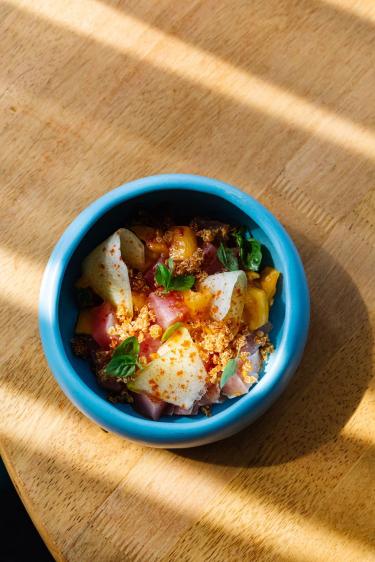Review: Osteria Georgi Brings Polished Upscale Italian to Chapel Hill
A clean, well-lighted place

Posted October 11, 2021
10-11 2021
At Osteria Georgi in Chapel Hill, the supporting elements on the plates—creamy white ricotta on a bowl of meatballs, the bright acid tang of panzanella alongside roasted chicken—make all the difference.
Beets y Gorgonzola ($12) are given equal billing on the antipasti slate, so one might expect beets tossed with big chunks of white, blue-veined cheese. Instead, the veggies are front and center in a heaping purple mound tossed with a smattering of shredded radicchio. The gorgonzola is hidden away at the bottom in the form of a creamy dressing, and the combination really works, adding a smooth but pungent accent to the beets’ sweet, earthy bite. A few slices of strawberry sneak in surprising bursts of sweet fruit.

The polpette di manzo ($12) have a satisfyingly firm, tender texture, but what really makes the plate is the rivulet of white ricotta oozing over the top of the meatballs, especially when it merges with bright red tomato puree into a creamy, succulent sauce.
There are plenty more surprises like these at Osteria Georgi. The Georgi in the name is not, as one might expect, an Italianized form of owner Giorgios Bakatsias's first name. Instead, it honors his late friend George Tarantini, the long-time coach of the NC State men’s soccer team, who passed away in 2019.
The restaurant opened this spring on Elliot Road, taking over the ground floor space in the Berkshire Chapel Hill apartment building that formerly housed upscale vegan café Living Kitchen. Bakatsias snared an illustrious chef as a partner, too, bringing locally-born Dan Jackson back home to Chapel Hill.
Sign Up for the Weekly Dispatch
Our weekly FREE email newsletter, delivered directly to your inbox
Sign Up NowAfter graduating from UNC, Jackson headed north to New York City for a career in a string of acclaimed restaurants, including Eleven Madison Park and Union Square Hospitality. That uptown pedigree shows in the pasta courses, which are well-crafted and exhibit the same sort of flourishes as the antipasti. Ricotta returns along with eggplant and fennel sausage in the rigatoni di norma ($19), while ricotta-stuffed agnolotti ($19) are served with end-of-summer veggies like corn, tomato, and squash in a cream sauce.
The tagliatelle alle vongole ($23) is a solid if imperfect plate. The jet black ribbons of squid ink pasta are delightfully tender, and they’re artfully dressed in a delicious tomato-laced sauce. The half-dozen clams resting in their shells on top, though, tend toward the rubbery side, and a stray herb adds an occasional harsh note to an otherwise splendid sauce.
Whether one prefers the firmer bite of the bucatini alla Amatriciani ($19) comes down to personal preference—a matter of the tooth, if you will. On this simple plate the pasta is the star, the long, thick strands tossed in a spartan tomato sauce with a few halved cherry tomatoes. With a big zip of Calabrian chili and a scattering of green herbs, it’s all spice and texture and quite an enjoyable dish.

Sometimes the casting doesn’t quite gel. On the evening I tried it, the crudo del giorno ($16) was yellowtail tuna, but the fish selection probably doesn’t matter much. Georgi’s is served not on a flat plate but in a deep bowl, with a jumble of tuna, watermelon, and tomato cut into equal-sized cubes and tucked beneath a blanket of shaved radishes, crunchy quinoa, and slightly-bitter microgreens. It’s more a salad with raw tuna than the typical crudo preparation, where thinly-sliced fish is the primary element. Here the tuna is more an ensemble player. That doesn’t mean it’s a bad dish, but it might not be the one you expected going in.

That there is a new restaurant serving these sorts of plates is itself notable, for the last few years have not been kind to fine dining in the Triangle. I’m not just talking about the impact of the pandemic, for the area’s fine dining slump pre-dates the arrival of COVID-19 lockdowns, and only a handful of new restaurants in the higher-end category have opened in recent years.
Many of the Triangle’s most acclaimed chefs and restaurateurs have instead channeled their energies into more casual, comfort-oriented ventures. Ashley Christensen is on the cusp of launching a small chain of fried chicken sandwich joints called BB’s Crispy Chicken. Scott Crawford’s next outing, Crawford Cookshop, will offer “approachable” wood-fired items like burgers, wings, and ribs. When younger veterans of local fine dining kitchens have set out to launch their restaurants of their own in recent years, they’ve tended toward barbecue, pizza, and noodle bowls, not fancy sauces and micro greens.
Giorgios Bakatsias has been a notable exception. His Giorgios Group not only launched Osteria Georgi at the end of April but has another in the works with the Asian-themed Krill, which will open soon on Ramseur Street in downtown Durham.
One can observe the experienced hand at work in Georgi’s setting. Many of the sleek, modern interior elements of the old Living Kitchen space remain—the white tiled open kitchen, the high ceilings with exposed ductwork. But tall potted plants now add a splash of greenery, and sheer drapes cloak the tall plate glass windows, softening the room and making it feel more enclosed.

Plenty of greenery adorns the big open air patio on the side of the building, too, with a dozen tables beneath strings of white lights and a red and white canopy—a pandemic-era accommodation that seems destined to become a permanent feature of the dining scene.
This modern, well-lighted setting seems a proper match for the sleek professionalism of the larger plates. The Secondi lean toward American fine dining workhorses, but always with an intriguing twist. The grilled New York strip ($34) is served not with potatoes but atop a substantial bed of spinach-laced cannellini, while the branzino ($34) is paired with sweet potatoes.
The pesce alla puttanesca ($28) is a set piece with Sardninian couscous and summer squash accompanying whatever the fish of the day is. It was salmon the night I tried it, and the fish was cooked flawlessly—crisp and brown around the edges, juicy and slightly flaky inside. The pea-sized orbs of couscous are impressive, too, their tender, slightly chewy texture enrobed in a brightly acidic tomato sauce dotted with black olives. The only problem is that the two elements don’t play well together. That brilliant couscous seems much better suited for a firm white fish, like the grilled swordfish with which it has often been served on other nights.
One might shy away from roasted chicken as boring and safe, especially at an upscale Italian restaurant, but passing over the pollo al mattone ($24) would be a mistake. It’s a brash, energetic dish, and it makes a strong entrance before you even take a bite, with the aroma of seared chicken skin wafting over the table as the oval plate arrives. The meat is properly juicy, and the golden brown skin delightfully crisp, but even more wonderful are the sweet, acidic bursts from the bottom of the plate in what’s billed as a panzanella salad. I suppose there’s some bread in there somewhere, but the sweet yellow corn, tomatoes, and—more than anything—the bright tang of the sauce really steals the spotlight.

All in all, Osteri Georgi seems to tip-toe along the line between accessible Italian comfort and edgier high-end cuisine. The bar side of the house offers some intriguing options, too. These include not just a selection of negroni variations and aromatized wines but an impressive shelf of more than a dozen amari. (Amaro appears to be having quite the moment right now, as Matt Lardie recently explored here in The Dispatch.)

I, for one, am encouraged to see fine dining still moving forward in the Triangle, even if it’s just one step at a time. New arrivals like Georgi aren’t likely to prompt the New York fooderati to book flights to RDU, and the sleek, modern vibe won’t transport you to the streets of Rome and make you forget you’re sitting just outside Chapel Hill in a newish multiuse development.
What it offers, though, is a fine new setting for an upscale night out, with dishes that push gently at boundaries and offer plenty of delicious surprises. And we certainly could use more of that these days.
About the Author
Robert F. Moss
Robert F. Moss is the Contributing Barbecue Editor for Southern Living magazine and the author of six books on food, drink, and travel, including The Lost Southern Chefs, Barbecue: The History of an American Institution, Southern Spirits: 400 Years of Drinking in the American South, and Barbecue Lovers: The Carolinas. He lives in Charleston, South Carolina.

